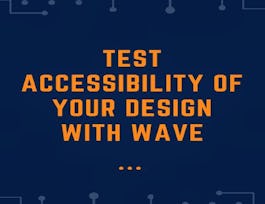This second course in statistical modeling will introduce students to the study of the analysis of variance (ANOVA), analysis of covariance (ANCOVA), and experimental design. ANOVA and ANCOVA, presented as a type of linear regression model, will provide the mathematical basis for designing experiments for data science applications. Emphasis will be placed on important design-related concepts, such as randomization, blocking, factorial design, and causality. Some attention will also be given to ethical issues raised in experimentation.



ANOVA and Experimental Design
This course is part of Statistical Modeling for Data Science Applications Specialization

Instructor: Brian Zaharatos
Sponsored by Barbados NTI
5,210 already enrolled
(17 reviews)
Recommended experience
What you'll learn
Identify and interpret the two-way ANOVA (and ANCOVA) model(s) as a linear regression model.
Use the two-way ANOVA and ANCOVA models to answer research questions using real data.
Define and apply the concepts of replication, repeated measures, and full factorial design in the context of two-way ANOVA.
Skills you'll gain
Details to know

Add to your LinkedIn profile
1 quiz, 23 assignments
See how employees at top companies are mastering in-demand skills

Build your subject-matter expertise
- Learn new concepts from industry experts
- Gain a foundational understanding of a subject or tool
- Develop job-relevant skills with hands-on projects
- Earn a shareable career certificate


Earn a career certificate
Add this credential to your LinkedIn profile, resume, or CV
Share it on social media and in your performance review

There are 4 modules in this course
In this module, we will introduce the basic conceptual framework for experimental design and define the models that will allow us to answer meaningful questions about the differences between group means with respect to a continuous variable. Such models include the one-way Analysis of Variance (ANOVA) and Analysis of Covariance (ANCOVA) models.
What's included
9 videos3 readings9 assignments2 programming assignments1 peer review1 discussion prompt2 ungraded labs
In this module, we will learn how statistical hypothesis testing and confidence intervals, in the ANOVA/ANCOVA context, can help answer meaningful questions about the differences between group means with respect to a continuous variable.
What's included
6 videos2 readings1 quiz3 assignments1 programming assignment1 peer review2 ungraded labs
In this module, we will study the two-way ANOVA model and use it to answer research questions using real data.
What's included
7 videos6 assignments1 programming assignment1 peer review1 ungraded lab
In this module, we will study fundamental experimental design concepts, such as randomization, treatment design, replication, and blocking. We will also look at basic factorial designs as an improvement over elementary “one factor at a time” methods. We will combine these concepts with the ANOVA and ANCOVA models to conduct meaningful experiments.
What's included
7 videos2 readings5 assignments1 programming assignment1 peer review2 ungraded labs
Instructor

Offered by
Why people choose Coursera for their career




Learner reviews
17 reviews
- 5 stars
64.70%
- 4 stars
5.88%
- 3 stars
5.88%
- 2 stars
11.76%
- 1 star
11.76%
Showing 3 of 17
Reviewed on Jul 30, 2022
Great course. Really useful and practical, and the exercise is not too difficult.
Recommended if you're interested in Data Science

Coursera Project Network

The University of Sydney

Universiteit Leiden

University of Leeds

Open new doors with Coursera Plus
Unlimited access to 10,000+ world-class courses, hands-on projects, and job-ready certificate programs - all included in your subscription
Advance your career with an online degree
Earn a degree from world-class universities - 100% online
Join over 3,400 global companies that choose Coursera for Business
Upskill your employees to excel in the digital economy


